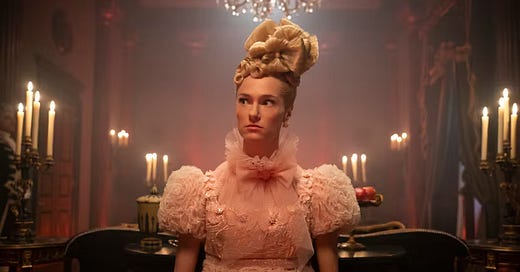Cressida is the Unlikely Feminist Hero of Bridgerton.
Bon voyage Cressida Cowper, we hardly knew ye.
Every heroine needs a good enemy, and superficial mean girl Cressida Cowper (Jessica Madsen) rose to the occasion in season three of Bridgerton. But in the age of the anti-hero, Cressida ran the risk of overshadowing this season’s protagonist and Cressida’s long-time rival, Penelope Featherington (Nicola Coughlan).
Penelope was revealed to viewers as the mysterious gossip monger Lady Whistledown in season one, and since then has tried to obscure the ’Ton from unmasking her secret identity. That all came to a head this season as her former bestie Eloise Bridgerton (Claudia Jessie), who found out about Pen’s extracurricular activities that give extra meaning to her nickname, threatened to tell her brother Colin (Luke Newton), whom Penelope has snagged a surprise engagement to after years of pining for him. Meanwhile, Queen Charlotte (Golda Rosheuvel) is fed up with Whistledown’s gossip but, more to the point, with Whistledown knowing more than her, so she puts a bounty on Whistledown’s head.
Enter Cressida: through her burgeoning friendship with Eloise, in search of a replacement for Penelope after their fallout, Cressida is slowly having her eyes opened to the misogyny of the Regency-era marriage market.
“The season has a way of coming between young ladies. Pitting us against one another,” she tells Eloise.
Despite being overly concerned with looks and station, Cressida hasn’t managed to snag herself a husband after two years out. She’s neck and neck with Pen on their unwilling race to become spinsters and their parents are becoming either desperate or resigned to that fact. Penelope’s mother, Lady Portia Featherington (Polly Walker), believes her youngest daughter will always be around to look after her, which spurs Pen to get a makeover and really try at this whole courting thing. Cressida’s prospects are dwindling, so her mother, Araminta (Joanna Bobin) (these names 😂) tries to set her up with an elderly friend of her father which might not be so bad, Cressida reasons, because he won’t want to have sex and will probably die soon, leaving her to inherit all his money for even more outlandish clothing. No such luck: the older gentleman wants many children and expects his wife to mirror his austere lifestyle, one without fashion, art, music or socialising.
Cressida has to prevent this, so sees an opportunity in the Queen’s bounty. She figures that Whistledown will want to maintain her secrecy, so jumps at the chance to assume it despite protestations from her mother.
“If you cement your reputation as Whistledown, no one will marry you,” Araminta pleads.
“No one will marry me now,” Cressida deadpans in the funniest line of the season.
With the money she doesn’t have to marry the crypt keeper and can buy an apartment in Vienna. “Think of the freedom, power…” Portia says wistfully at a salon where the ’Ton are discussing Whistledown. Given Portia’s own status as a single woman (widow) with money troubles, perhaps it’s something she would have chosen for herself in another lifetime, or her own daughter, Penelope, who at this point in the story has lost her newfound empowerment from earlier in the season and has taken to fainting at the drop of a top hat.
It takes Cressida’s snatching of the Whistledown title to wake Penelope up to the fact that while she might have gotten the guy of her dreams, she doesn’t want that to come at the expense of the life she carved out for herself in the meantime.
“What about my dreams?” Penelope ponders.
“Ladies do not have dreams. They have husbands,” her mother retorts.
After three seasons of this, I’m still shocked at how little power women have and how little respect they are afforded by their husbands in Regency-era Britain (and, one could argue, today, but I digress). Once Colin follows Penelope to the printer to produce one last issue of Lady Whistledown to discredit Cressida and uncovers her secret, his attitude towards Pen is inflected with anger perhaps owing to the fact that she’s not the helpless girl next door he so often viewed her as.
“You do not decide what we do,” he tosses off when Penelope offers alternatives to paying Cressida to keep pretending to be Whistledown when she finds out that Pen has been Whistledown all along.
Ultimately, Penelope decides to claim Whisteldown because she has “worked too hard for too long” to let someone else take credit for her work, finally showing the backbone that Cressida forced her to grow.
Though Cressida has brought shame on her family and been exiled to Wales to live with her aunt and, thus, exiled from our memories, her influence can be felt in a slightly more feminist ’Ton. Despite obtaining the life Cressida decided she didn’t want, Penelope is also freely writing the Whistledown column under her own name (vale—presumably—Julie Andrews), prompting her sister Phillipa (Harriet Cains) to ponder whether her own daughter will go on to be a famous writer, “without any need for a husband.”
Bon voyage Cressida Cowper, we hardly knew ye.





